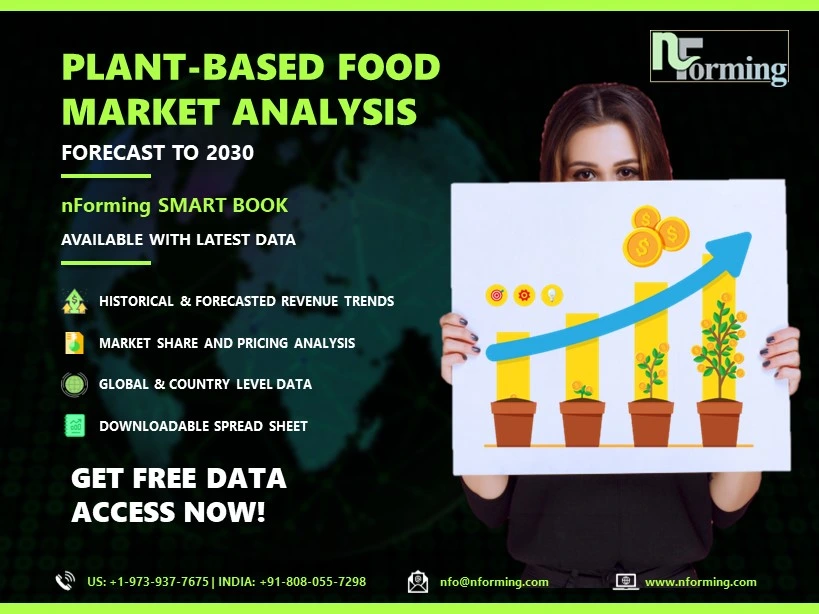
Plant Based Food Market Definition
In the plant based food market, food and food tech companies manufacture and sell plant-based foods, including plant based dairy products such as plant based milk, plant based yogurt, plant based cheese, plant-based spread, and other plant based dairy products like cream, butter, and ice cream, among others. Other than dairy products, the companies also sell plant based meat, plant seafood, plant protein liquids and powders, plant baked goods, plant condiments and dressings, and other plant based products such as plant based desserts, plant based protein bars, and plant based ready-to-drink beverages. The products are purchased by businesses and individuals for personal use or commercial use.
Food and Food technology companies, which also produce and generate revenue from plant based oils, do not contribute to the plant based food market. Additionally, revenues from the unorganized plant based food market and plant based foods that are intended for other than human consumption are excluded.
nForming plant-based food market smart book
The nForming plant based food market smart books include historical and forecasted information regarding revenue, sales volume, prices, and more for each segment covered at the regional and country level. The smart book also includes information regarding the main suppliers and their share of the plant based food market. The qualitative aspects include detailed growth drivers, opportunities, and challenges for the plant based food market.
Plant Based Food Market Trends
Meat consumption has declined globally during the last decade. The availability of plant-based substitutes, which have advanced from being a niche product to being widely available in the majority of sizable supermarkets and eateries, is what has caused this decline.
Furthermore, consumers around the world are expected to eat less meat or substitute it with plant-based foods to varying degrees. According to the results of this study, which was conducted in early 2022, customers in Peru and Mexico were the most likely to do so. According to 64% and 61% of respondents, respectively, they are inclined to eat less meat or substitute it with an alternative such as beans. While Japan and Canada had the lowest proportion of consumers who are expected to eat less meat, they also displayed a noticeable statistic of 29% each.
Health concerns dominate the decision of consumers to limit meat consumption
(Graph of countries consuming meat and alternatives can be inserted. Other data sets to be taken as per the requirements from the link below)
According to the McKinsey China Protein Survey 2022, many conscientious Chinese consumers aim to reduce their meat intake even further, though not to the extent of European consumers. Few traditional Chinese meat eaters share that goal. In China, conscious customers are mostly females and members of the baby boomers.
The growth of consumers on a meat-less diet is slowing
According to a survey by the consultancy New Nutrition Business, a growing number of consumers consider the density of nutrients to be a crucial component of their diets, while the proportion of customers who eliminate meat from their diets is leveling off. The countries included in the poll were the United States, the United Kingdom, Australia, Spain, and Brazil.
In all five nations, 24% of respondents indicated they were cutting back on meat intake, the same percent as in 2020. Brazil had the largest percentage of consumers consuming less meat (31%), followed by Spain (30%). According to the report, customers aged 55 and older are more likely than younger customers to reduce their meat consumption.
To overcome this challenge, companies operating in the plant based food market should either target a specific regional audience or focus on new strategies to boost the growth in the number of consumers that are substituting meat with plant based food.
Plant Based Food Market’s Key Suppliers
- Amy’s Kitchen Inc. (U.S.)
- Atlantic Natural Foods LLC (U.S.)
- Axiom Foods (U.S.)
- Beyond Meat Inc. (U.S.)
- Daiya Foods Inc. (Canada)
- Danone SA (France)
- Earth’s Own Food Company Inc. (Canada)
- Follow Your Heart (U.S.)
- Garden Protein International, Inc. (Canada)
- Impossible Foods Inc. (U.S.)
- Lightlife Foods, Inc. (U.S.)
- Marlow Foods Ltd. (U.K.)
- Nestlé S.A. (Switzerland)
- Nutrisoy Pty Ltd. (Australia)
- Sahmyook Foods (South Korea)
- Sanitarium Health and Wellbeing Company (Australia)
- Taifun –Tofu GmbH (Germany)
- The Hain Celestial Group, Inc. (U.S.)
- VBIte Food Ltd (U.K.)
Plant Based Food Market Segmentation:
Plant Based Food Market, By Product Type |
|
Plant Based Food Market, By End-Users |
|
Plant Based Food Market, By Source |
|
Plant Based Food Market, By Distribution Channel |
|
Plant Based Food Market, By Purchase Mode |
|
-
GET FREE DATA ACCESS!

